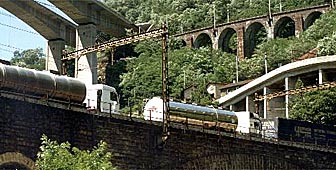EU-bilateral accords: do they threaten the Swiss environment?

The Swiss are taking part in a historic vote on Sunday. They will decide whether to accept a series of bilateral accords with the European Union, designed to eliminate most trade barriers. In this report, Robert Brookes looks at the transport agreement.
The issue of overland transport was one of the biggest challenges in the bilateral negotiations between Switzerland and the European Union and it is regarded as the hardest nut that negotiators on both sides had to crack.
In it, the European Union acknowledges Switzerland’s aim of switching as much transalpine goods transport as possible from road to rail and the incentive to do that – a mileage related heavy vehicle tax.
“Switzerland plays the role of ecological workhorse in overland transport. With the Overland Transport Agreement, it has succeeded in convincing the EU that switching from road to rail is the right way of managing the increasing amount of heavy goods traffic. The future belongs to the railways,” said Swiss transport minister Moritz Leuenberger.
But while the EU has been convinced of accepting the road to rail policy, it has also forced Switzerland to raise gradually its maximum weight limit of trucks from the current 28 tons to the EU norm of 40 tons.
To compensate for this and help contribute to the two new major rail tunnels being built through the Lötschberg and the Gotthard, Switzerland will introduce a comprehensive and emission-related heavy vehicle tax.
From the time the first base tunnel is opened, but no later than 2008, a 40-tonne truck will pay an average tax of SFr325 for the stretch Basel to Chiasso. “Dirty” trucks – those with high emission levels – will pay as much as 380 francs. That is 13 to 15 times higher than the SFr25 which a 28-tonner has to pay to transit Switzerland at present.
Transalpine goods transport in Europe has risen continually in recent years, with Switzerland feeling this considerably. For example 1.2 million trucks crossed the Swiss Alps in 1998 – more than ever before.
The law on switching transport to rail establishes that as soon as possible, but no later than two years after the opening of the new Lötschberg tunnel (around 2006), no more than a maximum of 650,000 trucks should be crossing the Alps by road.
If the overland transport agreement had not been part of the package of seven accords, it would have aroused considerably more opposition than it did. The Swiss Transport and Environment Association, a pressure group based in Berne, has said if the transport agreement had stood alone, it would have rejected it.
“This land transport treaty is a danger for our transport policy of goods from road to rail. We have 1.2 million trucks a year on the transit routes now. With the transport treaty we will get until 2005 perhaps 1.9 million,” said Hans Kaspar Schiesser, head of transport policy at the Association.
“That of course is not good for the Alps, for nature, for our economy and also for people living in Switzerland, particularly in the Alpine valleys,” he added.
The Association is also urging improved truck safety measures, including an automatic fire extinguisher, cowcatchers to protect pedestrians and a video system for drivers of trucks hauling dangerous loads.
by Robert Brookes

In compliance with the JTI standards
More: SWI swissinfo.ch certified by the Journalism Trust Initiative
You can find an overview of ongoing debates with our journalists here. Please join us!
If you want to start a conversation about a topic raised in this article or want to report factual errors, email us at english@swissinfo.ch.